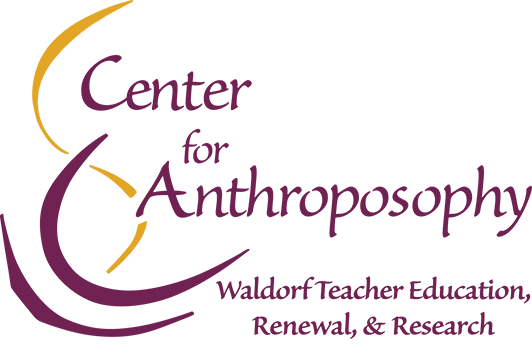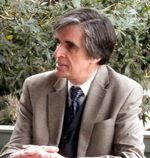 Re-flect: its original meaning is “to bend back” — but also “to curve”, as in falcate, the blade of a scythe. This is the theme for our Spring 2015 issue of Center & Periphery, the online newsletter of the Center for Anthroposophy.
Re-flect: its original meaning is “to bend back” — but also “to curve”, as in falcate, the blade of a scythe. This is the theme for our Spring 2015 issue of Center & Periphery, the online newsletter of the Center for Anthroposophy.
A quintessential aspect of the Consciousness Soul, self-reflection is evident–though perhaps frozen–in the artifacts of modern technology, and rejuvenated through the eternal fonts of renewal and foundation studies that draw from the depths of Waldorf education.
In self-reflection, consciousness circles back on itself, and is renewed through that encounter.
— Douglas Gerwin, Director Center for Anthroposophy
Dateline Amherst MA: The Self and the Selfie Stick
In this new technological device we may glimpse the forerunner of an advanced human capacity. Douglas Gerwin, Director of the Center for Anthroposophy, offers a brief snapshot.
For longer than we have kept historical records, we have hiked with walking sticks and guided our discussions with talking sticks. Now we have the selfie stick.
Patented a decade ago in 2006 by the Canadian inventor Wayne Fromm, the selfie stick allows you to hold a camera at up to three times the length of your arm as you take a picture of yourself. For $10 and up you can get a stick with advanced Bluetooth capability that will snap a photo instantly rather than make you wait for the delayed timing of your camera or smartphone to determine the actual shot.
The selfie stick (originally called “monopod”) makes you much more self-reliant. No longer do you need to ask a passing stranger to take your picture in a particular setting. You have become the self-sufficient recorder of your own circumstances. And it allows you, furthermore, to mark off a territory as distinctly your own, for at least the time you are taking your picture in it. As Fromm put it in a recent interview, “With the selfie stick, people are forced to walk around you. That was one of its selling features.”
Should the loneliness wrought of this medium feel too painful, however, you can now purchase instead a “selfie arm”; this is a stick in the shape of a prosthetic limb to give the illusion that as you snap yourself you are shaking hands with someone standing outside the frame of the picture.
But whether as a stick or as an arm, a growing list of institutions–from the Colosseum in Rome and the Palace of Versailles to soccer stadiums in Brazil and the famed Wimbleton tennis competition in London–have slapped bans on selfies, fearing safety concerns or what the organizers of the British Open Tournament call their “nuisance value”. The Australian Open, the first grand slam competition to crack down on the use of these sticks, has designated special “selfie zones” placed at a safe distance from the crowded stands.
Leading museums and art galleries around the world, likewise concerned about baton-wielding tourists, have outlawed the selfie stick as well. They report that photographers using these devices are so concentrated on themselves that they become oblivious to what is going on around them. According to the curators, this narrowed focus poses dangers when practiced in crowded settings or in close proximity to priceless works of art.
* * * * * * *
Even without the use of a stick, the popularity of the self-administered photograph points to a phenomenon of our times. At some level, we yearn to view–or at least photograph–ourselves as others see us.
Rudolf Steiner identified this yearning as a symptom of a deeper wish to see, not just our faces but our inner selves as we appear to the world around us. He attributed this thirst for self-knowledge to what he called the Consciousness Soul, an aspect of ourselves which, if deliberately cultivated, liberates us from our subjective perspective (“looking from the inside out”) and gets us to perceive ourselves objectively and dispassionately (“from the outside in”), viewing ourselves as though we were a stranger. It is our mission to develop objective self-reflection, he said, since this advanced spiritual capacity is a precondition to attaining true human freedom.
In order to strengthen this capacity, Steiner offers a helpful contemplative exercise–known as the “Rueckschau” or retrospect–in which each evening you picture your day in reverse order. The key to this exercise is to imagine the events of the day not from the perspective out of which you experienced them but from the point of view of an objective observer beholding you in the context of your day as though “from the outside”.
In a lecture on human development, Steiner characterizes the devices of technology as representing harbingers–albeit prematurely precipitated into physical form–of advanced spiritual capacities of all kinds that it is our task to develop into future times. On this view, for example, the telephone and television are precursors, in material form, of our nascent ability to communicate at a distance (clairaudience) or see at a distance (clairvoyance).
For as long as these devices are used as tools to enhance the development of spiritual capacities, they can serve the advancement of human consciousness. The mischief begins when a technological device supplants–rather than enhances–these capacities so that we grow dependent upon the tool rather than strive to develop spiritually the capacity that it simulates in material form.
From this vantage point, then, one can also view the selfie–and by extension the selfie stick–as a physical precipitate of a central responsibility of the Consciousness Soul: namely, to develop a more objective awareness of who we are and of the context in which we find ourselves. To the degree we awaken to the objective relationships existing between “I” and “world”, the selfie confirms what we already perceive and thereby strengthens that understanding. But put the selfie ahead of self-development and we are headed down the road of the original selfie-wheeler, who was depicted in ancient mythology as Narcissus.
And we all know–or should know–what became of him. Utterly self-absorbed, he lost all touch with his surroundings, and ultimately with himself. In him the development of Consciousness Soul was arrested, even reversed. He fell victim to what one contemporary commentator has dubbed the “narcistick”.
Though it can provide a photo of our outer appearance, the selfie stick will not supply us with a picture of who we really are. But it may remind us–metaphorically, through its inherent gesture–how to attain one.
Dateline Wilton NH: Renewal Courses for Summer 2015
Karine Munk Finser, Coordinator of CfA’s popular Renewal Courses, reports on the latest line up of star-studded seminars and workshops, plus a performance involving life-sized marionettes.
Dear Friends,
We are preparing for Renewal in New Hampshire, as the world around us is springing into flower! There’s a busyness and anticipation in the air which we can only join as we imagine many of you coming to the beautiful High Mowing hill in Wilton. As always we strive to offer courses that are grounded in Anthroposophy and in an artistic process so you may truly feel renewed and refreshed.
Week 1: June 21st to June 26th
After dreaming of bringing Goethe’s Fairy Tale back to Renewal after many years, we are delighted to be able to bring “The Green Snake and the Beautiful Lily” to life among us, using large original marionettes. Joan Almon and Janene Ping are collaborating in a course together with Speech artist Debra Spitulnik. Channah Seidenberg and her lyre musicians will join us with her original music created for the Fairy Tale. Christof Andreas and Norma Lindenberg will come as well! The performance of the fairy tale, which is open to our community friends, will take place at the Pine Hill Auditorium, Thursday June 25th at 7:30p.m.
Another great piece of news is that Georg Locher’s son, Adrian Locher, will offer a dynamic course on the Temperaments that will include drama and a transformative path for any workplace. This course will be of interest to parents, staff, board members, teachers, and all who work to strengthen their school communities.
Christof Wiechert, who was the Leader of the Pedagogical Section at the Goetheanum for over a decade, will return with a course to help bring new courage, inspiration, and joy into teaching. Classroom management, daily rhythms, and other practical approaches to daily work with the children will be his themes.
For those who have attended previous Renewal Courses related to teaching in the elementary grades: We’ve listened to you! In your reviews of previous years, you told us that you wanted separate courses for each grade and we are happy to share with you these wonderful teachers’ names that each represent a grade from 1 to 8:
Christopher Sblendorio, Kate Golden, Neal Kennerk, Dennis Demanett, Patrice Maynard, Helena Niiva, Sue Demanett and Louis Bullard, and Darcy Drayton.
In addition, Christof Wiechert will offer a short morning lecture with new themes to all these class participants.
Elizabeth Auer is offering an overview of drawing in the elementary grades with various media. Block schedules and block content including written material will be offered to each participant. Main lesson book drawings and blackboard drawing will also be prepared.
World Languages! We are so fortunate to have two experienced and delightful language teachers offering grades a course for grades 1, 2, and 3. Kati Manning and Lorey Zahn (formerly Johnson) are a dynamic duo who will inspire you with curriculum, drama exercises, and more for your world language classes. Another benefit will be a rich sharing of games, songs, and poems among the participants.
We are glad to offer Music and Singing in the classroom with experienced Waldorf teacher David Gable. In this course teachers will develop singing techniques, practice recorder, and learn techniques throughout the grades. Lectures by Rudolf Steiner will be included to help understand the importance of music in the education of children.
Week 2 : June 28th to July 3rd
This year we welcome back Michaela Gloeckler, who will be leading a course entitled “Healing Aspects to Address Trauma in Childhood, Adolescence, and in Biography”. She will also offer an evening lecture open to community members on July 1st.
Christopher Bamford is offering a course on the Women around Rudolf Steiner. This promises to be a profound journey for all who come to work with this deeply devoted teacher.
Patrice Pinette and Paul Matthews, both published poets and teachers extra-ordinaires, will join forces once again with a new course on poetry. This transformative journey will enhance your creative forces.
Michael D’Aleo is not only an original teacher but also a friend of authentic spiritual scientific exploration. In a new Renewal course, he will explore the relationship of Anthroposophy to Buddhism.
Jamie York returns with his popular course on teaching mathematics in the upper elementary grades: this is always a huge success and you will be glad you came to hone your math teaching skills in a lively and insightful manner.
Deb Soule will share her expertise and love of growing a herb garden for healing. This promises to be both an opportunity to learn about profound herbal qualities of healing and practice hands-on with these substances.
Charles Andrade will offer a veil painting course for both beginners and advanced painters. Participants in this course will learn to navigate the soul world of color with new skills, discoveries, and enjoyment.
John Cunningham and Barbara Richardson will lead a course on communication and conflict resolution, intended for teachers in leadership roles or administrators or board members of Waldorf schools. Torin Finser will offer advising sessions.
Carving with marble, anyone? Daniel O’Connors will help strong-bodied and hard-working carvers find their form, little by little, experiencing what Michelangelo may have felt, in moments of discovery between the human being and the stone.
The Journey through Christianity in Art will be explored and taught by David Lowe, an expert in Art History and the unveiling of deeper layers of understanding based on Anthroposophy. David will bring participants to the Boston Fine Museum of Arts for a guided tour during the middle of the week.
Finally we have our course in Self Education through Intuitive Thinking and Artistic Perception with Signe Motter, Douglas Gerwin, Hugh Renwick, Elizabeth Auer, and Cezary Ciaglo. Here, participants will discuss and deepen their understanding of foundational aspects of Anthroposophy while also working with artistic modalities.
Take a look at all of our course descriptions on our website. We hope to see many of you soon on the beautiful hilltop campus of High Mowing School in Wilton, New Hampshire.
We will be preparing and anticipating your arrival!
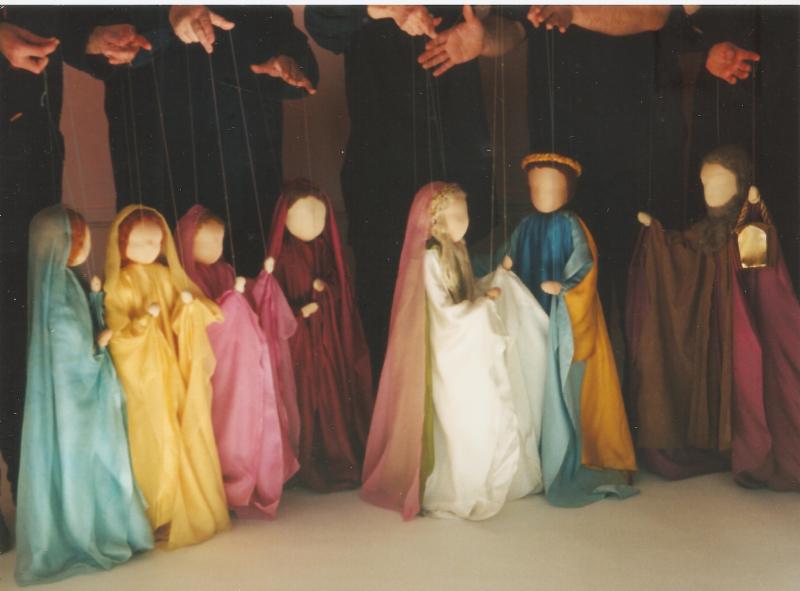
Dateline Wilton NH: Waldorf High School Program Turns 20
Each summer for the past 20 years, the Center for Anthroposophy has launched a new cycle of the Waldorf High School Teacher Education Program (WHiSTEP). Here a brief preview of the subjects being featured this summer.
How many teachers does it take to constitute a full high school faculty? At the Center for Anthroposophy, we calculate that number as approaching 12 (give or take a few, depending on the size of the school): 3-4 for humanities including languages; 3-4 for sciences and math; 3-4 for arts and crafts, as well as athletics. These numbers do not include administrative and non-classroom positions such as college and guidance counselors, after-school coaches, and office staff.
Each summer, the Center’s Waldorf High School Teacher Education Program (WHiSTEP) admits a new class of 10-15 students–in other words, the equivalent of a full high school faculty–ranging across the subject specializations. This year we are offering specialized “subject seminars” in Arts and Art History, English and Literature, History and Social Science, Life Science and Earth Science, Mathematics, Physics, and Chemistry.
About a dozen teachers from across the country have been accepted into the latest cycle of this month-long summer program, which includes seminars, artistic ateliers, and subject-specific workshops. The latest group of teachers–most of them already active in the classroom–will be studying with close to a hundred trainees in the Waldorf elementary teacher education program of Antioch University New England. All of these summer programs are held on the adjacent campuses of Pine Hill Waldorf School and High Mowing School in Southeastern New Hampshire.
Since the inception of WHiSTEP in July 1996, more than 150 students have completed this part-time three-summers program. Overall, around 65% of current and graduated students are working full or part-time at some 55 Waldorf schools in the English-speaking world. Of them, as of this year, WHiSTEP students or graduates are active in 36 of the 43 Waldorf high schools extant in North America, from the Hawaiian islands and the Pacific Northwest to the sultry Southeast and the rocky Atlantic coastline of Maine.
What Is Waldorf High School Teacher Education?
Dateline Freeport ME: Foundation Studies — Where Next?
With five clusters of Foundation Studies celebrating the completion of their two-year programs, a further string of clusters along the East Coast is already forming for the next school year. Barbara Richardson, Coordinator of CfA’s Foundation Studies program, reports.
After another successful year of course work, five clusters are wrapping up their studies including the first group sponsored by the Center for Anthroposophy in Anchorage, Alaska, which managed to complete its program in a single year of intensive studies.
Beyond this group in the far Northwest, clusters in Atlanta Georgia, Cincinnati Ohio, Freeport Maine, and at Lake Champlain in Northern Vermont all completed their second year of Foundation Studies in Anthroposophy and the Arts with closing seminars and graduation celebrations.
Four clusters–in Chapel Hill North Carolina, Gainesville Florida, Phoenix Arizona, and Wheat Ridge Colorado–are slated to launch or resume a second year of course work starting in the fall.
As for new programs, interest is building for another round of first-year clusters in:
- Asheville, North Carolina
- Baltimore, Maryland
- Beverly, Massachusetts
- Carbondale, Colorado
- Copley, Ohio
- Cincinnati, Ohio
- Hadley, Massachusetts
- Silver Spring, Maryland
For details on these clusters, or the option of studying privately with an Independent Mentor, contact Barbara Richardson, Coordinator of CfA’s Foundation Studies in Anthroposophy and the Arts, at brichardson@centerforanthroposophy
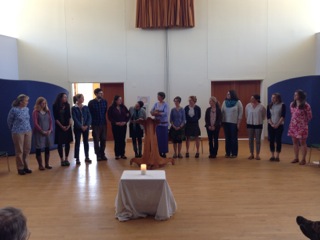
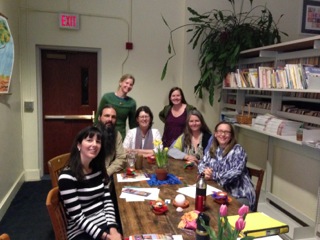
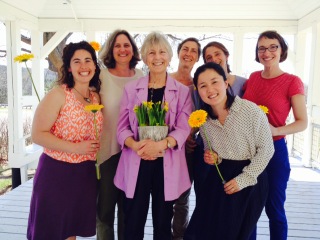
Atlanta Dateline Atlanta GA: Graduating from Foundations to . . . Foundations
Angela Foster, coordinator of several clusters of Foundation Studies in her home town, looks back on her third passage through this two-year program — six years in all.
Last weekend was an exciting time for the students in the Atlanta cluster of Foundation Studies in Anthroposophy and the Arts. We had our final class in the two-year series, followed by a celebration for the graduates. It was a beautiful Saturday with presentations from several students, a musical offering and extemporaneous reflections.
Year One was spent studying Rudolf Steiner’s How to Know Higher Worlds and Theosophy, along with Anthroposophy in Everyday Life. The bulk of Year Two was spent studying Biography, followed by workshops in the Philosophy of Freedom, the Christ Impulse, and Steiner’s Mystery Dramas. The course culminated in three sessions exploring his lectures on Metamorphoses of the Soul.
Besides the written word, a strong emphasis was placed on providing an introduction to several arts. Each time we met, we did some form of artistic activity, including eurythmy, singing, watercolor painting, form drawing, chalk drawing, and clay work. Over those many Saturdays of study and play–encountering new ideas, exploring our own biographies and cosmic thoughts, and sharing many meals together–the group grew incredibly close. What started for many as a simple step toward Waldorf teacher training turned out to be a soul-transforming experience that went far beyond expectations.
The students in this cluster would like to offer heartfelt thanks to the teachers from the Waldorf School of Atlanta who held the majority of our classes: Randy Evans, Laira Covert, Jim McClurkin, Francisco Moreno, and Eleanor Winship. We are grateful, as well, for those teachers who traveled to Atlanta to spend time with us. We were blessed to study with Douglas Gerwin, Rick Spaulding, Marke Levene, Patrick Kennedy, and Nathaniel Williams. Each teacher brought something unique from his field of research; every one of them brought a living connection with the spirit of anthroposophy.
As someone who has completed this course three times (that’s six years in a row!) I highly recommend the Foundation Studies program. Through Foundation Studies, I have made friends with people who come for many reasons — some considering to become Waldorf teachers, others pursuing the home-schooling of their children, a few who as school trustees were seeking a better understanding of the philosophy behind Waldorf education. Some are farmers and gardeners; many are artists looking to deepen their soul life. No matter the earthly reason that brings individuals to the program, I believe that those who come are answering a promise we made to ourselves long ago–a promise we may have forgotten for awhile but that is now ready to be fulfilled–a promise to come together in a new way, to explore the questions of our time, to discover why we are here and to awaken to our true destiny.
To wake up to this call of destiny and find a group of striving souls eager to share in the work is a beautiful thing. If you are considering forming a Foundation Studies cluster in your town, I send you much encouragement! Rest assured there are other souls nearby, just waiting to fulfill that slumbering promise with you.
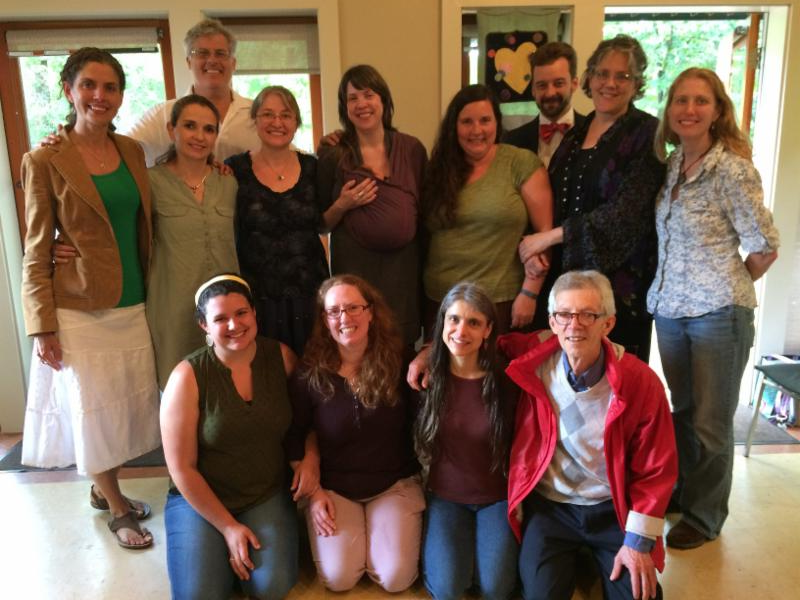
Dateline Wilton NH: Reconfiguring the Color Shop & More
After many years as an arts supply store, the Color Shop & More is undergoing reorganization.
At its annual spring meeting, the trustees of the Center for Anthroposophy voted unanimously to convert the Color Shop & More into a non-profit organization with a more specialized mission of serving students enrolled in CfA programs.
The Center, which bought the Color Shop and the building in which it is housed on Main Street, Wilton in 2008, has expanded its offerings over the past seven years to include books, toys, and gifts related to Waldorf education.
The store will retain its presence on Abbot Hill during the five weeks of Renewal Courses and teacher training programs in June and July as a popular shopping destination for arts supplies, books, and a selection of toys and gifts. As of August the storefront on Main Street in Wilton will close and be reconfigured for other purposes, starting in September. Stay tuned for further developments.
In the meantime, the store continues to be open Thursdays and Fridays from 11:00 a.m. to 5:00 p.m., Saturdays 10:00 a.m. to 4:30 p.m
